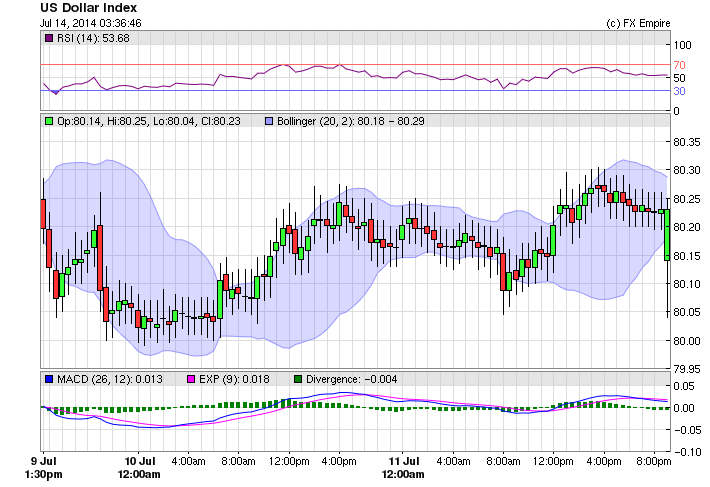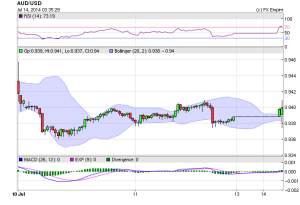On Monday morning there was little action in the Asian markets, which traded marginally positive, taking cues from higher US equities in the last week. This might prompt the yen to open a tad stronger; however, from the global front the euro currency is trading down and the US Index is higher at 80.26 indicating the gains might also be curtailed. Wall Street climbed on Friday, but closed lower for the week, as investors weighed quarterly results from Wells Fargo & Company (NYSE:WFC), and readied for a slew earnings ahead. Stress over Portugal’s banking sector receded and as investor attention turned to corporate earnings. The US budget deficit so far this fiscal year was the smallest since 2008 as a stronger economy bolstered tax payments by consumers and businesses, a government report showed. The $365.9 billion shortfall from October through June compared with a $509.8 billion gap in the same period a year earlier.

German Chancellor Angela Merkel said turmoil in global markets caused by a Portuguese bank underscores the euro region’s fragility and shows the need for governments to respect debt and deficit limits. Traders will await Mario Draghi’s speech later in the day. The euro is trading at 1.3603 this morning and expected to decline throughout the day. The European Central Bank plans to limit the amount of data it carries over from its asset review into a subsequent stress test as it tries to manage the burden from an unprecedented health check of euro-area lenders.

In Asia this morning the Aussie is trading just under the 94 price level after comments from the RBA. The Reserve Bank of Australia Governor Glenn Stevens said he sees the “likelihood of some disruption in markets” when the U.S. Federal Reserve raises interest rates. He reminded investors that the AUD is overvalued but his comments have no real effect this morning. The market will be dissecting the RBA Board minutes for July which will be released tomorrow for further hints to future monetary policy.
The Kiwi is remains near its record high at 0.8816 but flat this morning against the stronger US dollar. New Zealand’s currency surged this year as the nation’s central bank became the first in the Group of 10 to raise interest rates since 2011. At the same time, the Federal Reserve has reiterated its commitment to an accommodative monetary policy, with Chairwoman Janet Yellen saying last month that borrowing costs will stay at an all-time low for an extended period. A Credit Suisse Group index based on swaps shows traders are betting the Reserve Bank of New Zealand will increase its 3.25 percent main rate by another 0.84 percentage point in the next 12 months. The Fed has kept its benchmark rate in a record- low zero to 0.25 percent range since 2008.
The Japanese yen is light to start off the weak as global tensions seemed to ease over the weekend lowering safe haven demand on the Asian currency. The JPY is trading at 101.37 against the greenback and at 137.90 against the weak euro. A policy review by the Bank of Japan is due on Tuesday, a batch of Chinese economic data on Wednesday and earnings results from major global banks this week all but ensured a nondescript start for Asia.
